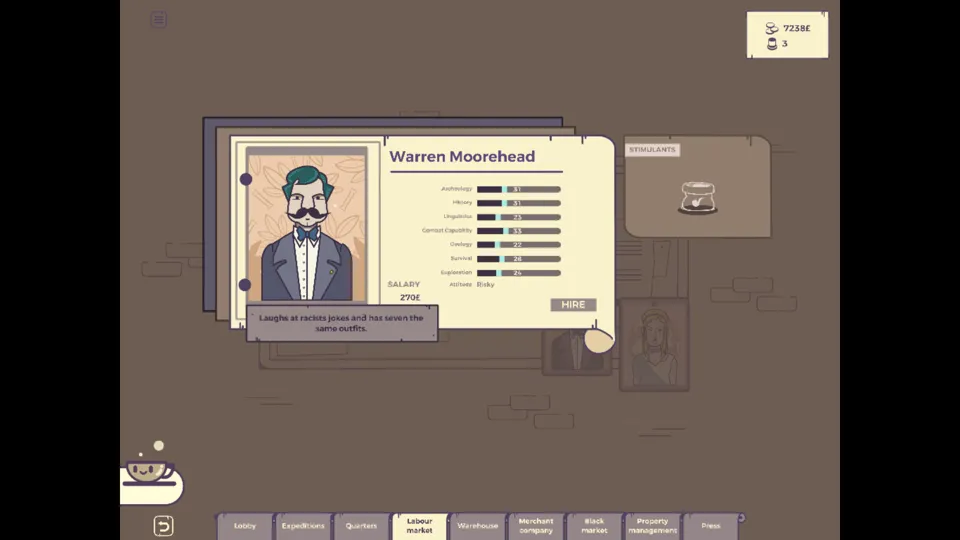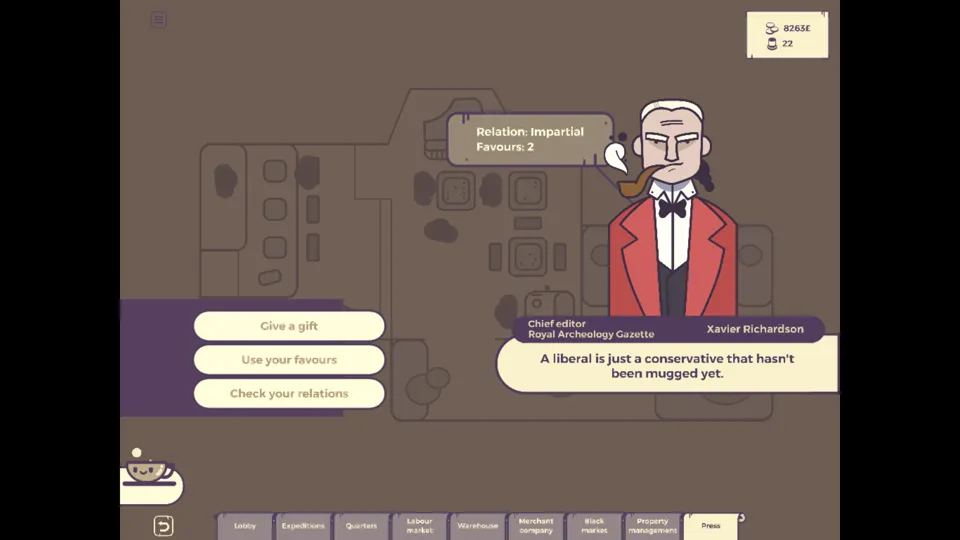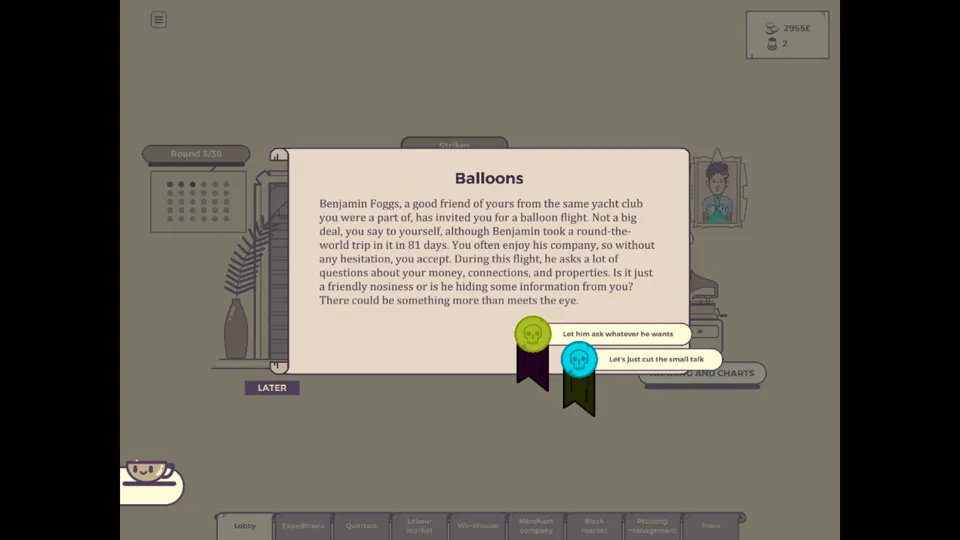Archeo Shinar
Between 80 Days , Renowned Explorers, and a host of other explorer-based games, it seems like Victorian-era exploration games are having a moment. Perhaps there’s something in the mythos of wandering off into the wilderness to seek one’s destiny that’s compelling. Based on the sense of humour in the aforementioned games, though, many of them seem to instead be interested in deconstructing the mythos of the brave, “civilising” colonial presence, “liberating” artefacts and returning triumphantly home in time for a lovely spot of tea. 80 Days deconstructs this trope by returning humanity to all those the adventurers encounter along the way. Renowned Explorers takes solace in the ridiculous. Archeo: Shinar belongs in this tradition as well, taking the ridiculousness of Renowned Explorers and cranking it up further. However, it also approaches this age of colonialism and exploitation unironically, providing the player with the opportunity to profit, however absurdly, off the fruits of looting.
 I believe this man is playing “generic British villain in a Tollywood film.”
I believe this man is playing “generic British villain in a Tollywood film.”
Archeo: Shinar is a turn-based strategy and management game. You manage a team of explorers, ostensibly on a quest to find the Tower of Babel, but more likely on a quest to find fortune and glory. Your team can be trained to improve their particular exploration skills, as well as boosted through items and the liberal application of attitude adjusments. They then go out on expeditions, hopefully returning successfully, but at least having a merry jape along the way.
Beyond the expeditions and team management, Archeo: Shinar also includes an array of options for what to do with the various artefacts the explorers return with, and how to improve your own reputation. The player can interact with the press to improve their standing and get favours, buy and invest in land, and sell artefacts. The game also includes random events that can help or hurt, but at least add a nice bit of flavour to the game.
 I think you’ll be proud of me. I could have made this entire review a grand political statement, and just for you, I am not.
I think you’ll be proud of me. I could have made this entire review a grand political statement, and just for you, I am not.
However much promise there is in the game’s concept, though, it’s the actual execution of these concepts that matters. The game can be effectively split into two aspects - the preparation and time between expeditions, and the expeditions themselves. The expeditions, for all the romp they are, are minimally interactive, with the main interaction being the party preparation beforehand, and choosing an explorer for a particular challenge when it arises. However, with each challenge being timed and no real information given about what the challenge is, beyond the needed skills, there is less the sense that you are submitting an explorer to a challenge, and more the sense that you are subjecting them to the mercy of a random number generator whose logic you are incapable of understanding. There is no transparency for the odds of success, neither during the expedition, nor during the preparation, leading to expeditions the player is woefully unprepared for, but which they had no real way of knowing they were unprepared for until it was too late.
 Pft, who would ever want to be part of that?
Pft, who would ever want to be part of that?
The management element of the game is similarly baffling. While there is a broad array of things to do, the reasons why I would do these things are not evident, nor are the actual victory conditions. Some, like the market, are straightforward, while others - like property and press - are confusing either in how to engage with them, or in why I would want to. It wasn’t until about a third of the way through the playthrough that I realised there was more I could do in the press room than just plying reporters with gin, but I am still unclear as to what the benefits actually are. Equally, while the property management seems like an interesting mechanic, beyond the basic elements of giving more money or resources, it’s unclear why I should engage with this element as heavily as the game seems to think I ought to be.
 Well that’s a bit dramatic.
Well that’s a bit dramatic.
Perhaps most bafflingly of all, I don’t really understand how to win this game. In my first mission, I was given a rival and thirty rounds, but no real indication of what victory against this rival looked like. Was it having more reputation at the end? Investing in property? I know I did lose at the end, but I’m not sure what I could have done differently.
Archeo: Shinar is a game that tries to be a lot, and in doing so, loses track of what it actually ought to be. There is the core of a fun game here, in expeditions and in preparing adventurers for an expedition. That game would have fit nicely in the zeitgeist of reevaluating British exploration and exploitation, and would likely have been a fun addition to that canon. Instead, Archeo: Shinar chooses to take on a much broader array of elements instead of focusing on the mechanic that its players came for. In adding property management or reputation instead of making the expeditions more compelling, it succeeds only in watering down the one thing that made the game interesting to begin with.
This game disappointed me. I love explorer games. The art looked fun, and what I saw of the writing looked like it echoed a style of humour I enjoy. Its needlessly complex mechanics, arcane win conditions, and reliance on random chance, though, left me feeling powerless and lost in a way I didn’t like and definitely didn’t sign up for.
I guess it is the quintessential explorer experience then, isn’t it?
Developer: Artists Entertainment
Genre: Turn-Based Strategy, Management, Indie
Year: 2019
Country: Poland
Language: English
Play Time: 14 Hours
Youtube: https://youtu.be/aJBP51MvnDs
